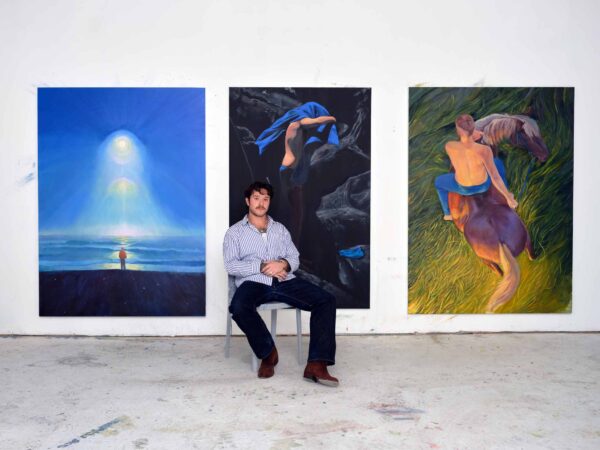The musician collaborates with director Matvey Fiks and screenwriter, lyricist, and Yorgos Lanthimos collaborator Efthymis Filippou in this absurdist romp through an Athenian chess club
Larry Gus—the stage name for musician Panagiotis Melidis—is stressed the fuck out. He’s in a darkened hall of clunky computers staring at one particular monitor that features a game of e-chess. Neither player’s made a move. “[RETRACTABLE PEN CLICKING]” reads the purple italic Helvetica subtitles, matching the pensive clack of Gus pushing a pen’s button. He puts the pen to his mouth, as if pondering something intensely—cue the melody of “Kerkis (Judas Tree),” a synthy tune similar to those of carnival carousels or ice cream trucks. The computer monitor he was gazing at replaces its chess game with an animated screensaver of a floating green branch sprouting purple flowers—the Judas-tree. The melody repeats. We’re suddenly in Athens’s Panellinio Chess Club, rather than the mysterious room full of computers, watching Gus sing what feels like an ode to the digital plant on his computer screen, though he’s now watching real people play real chess. He sets a tiny synthesizer on a loop and dashes out of frame.
Gus’s “Kerkis (Judas Tree)” music video then follows the artist’s romp over one impressively long three-minute take. Dancing through the chess club, he tries and fails to catch the attention of the three couples engrossed in their games. To accomplish such a durational feat for “Kerkis,” Gus worked with New York-based director Matvey Fiks and screenwriter Efthymis Filippou—a key creative mind behind Yorgos Lanthimos’s Dogtooth, The Lobster, and The Killing of a Sacred Deer—on the cinematic and auditory execution. The video also includes an easter-egg reference to the famed director: “The lyrics describe the transfer of a Judas-tree (Cercis siliquastrum) from Athens to the island of Hydra, and its planting in Lanthimos’s garden next to the century plants (Agave americana),” says Filippou. “No one knows if this plant is still alive and in what condition it is.”
But the plant is alive in Gus, who accepts his fate of being ignored in the club. He’s neither here nor there, not tuning into the three games of chess surrounding him, but playing his own tune very loudly; not playing e-chess by himself, but playing around.

















